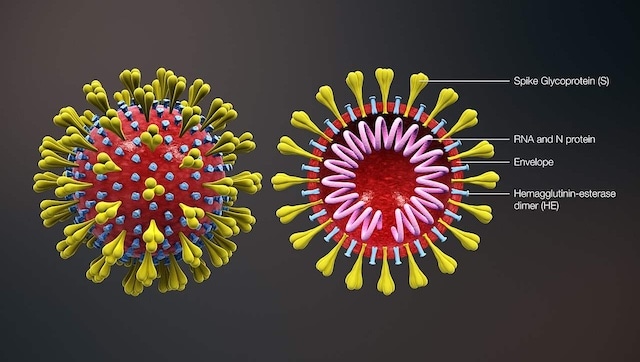
A group of researchers at the NYU School of Medicine claim that the neurological damage is not caused by the virus or inflammation in the brain but rather due to the low oxygen levels in the body associated with COVID-19.

The structure and cross-sectional view of Human Coronavirus. It shows depicting the shape of coronavirus as well as the cross-sectional view. Image shows the major elements including the Spike S protein, HE protein, viral envelope, and helical RNA. Image credit: Wikipedia
COVID-19 primarily affects the respiratory system, leading to symptoms like cough and breathing difficulties. However, the disease also affects other organs including the heart, blood vessels and the brain.
Over the past few months, coronavirus patients have reported several neurological symptoms ranging from delirium and confusion to encephalitis and seizures. Encephalitis is an inflammation in the brain that can occur due to viral, bacterial or fungal infections. Loss of smell, one of the most common symptoms in COVID-19 patients, is also suggested to be a neurological symptom.
Many patients report these symptoms much after they are treated for the infection itself.
So far, the exact cause of the symptoms is not known. Experts suggest it may be the virus itself or inflammation caused due to the disease. The latest study indicates that the long-term neurological effects of COVID-19 may include PTSD and doctors should take into account the patient’s mental health while treating such cases.
Now, a group of researchers at the NYU School of Medicine claim that the neurological damage is not caused by the virus or inflammation in the brain but rather due to the low oxygen levels in the body associated with COVID-19.
The study is published in the peer-reviewed journal Neurology.
How SARS-CoV-2 reaches the brain
Scientists don’t yet know for certain how the COVID-19 causing virus reaches the brain. However, several theories have been proposed to explain the possible routes.
Various areas in the brain including the hypothalamus and cerebral cortex have ACE2 receptors, which are the receptors used by SARS-CoV-2 to infect cells. Experts suggest that the virus may enter the brain through the olfactory bulb or through the gastrointestinal tract. It may travel through the vagus or trigeminal nerve or it may reach the brain through blood circulation when the virus spreads in the body.
Autopsy reports from early 2020 suggest that SARS-CoV-2 can enter the cerebrospinal fluid (the fluid that surrounds the brain and spinal cord) and lead to encephalitis.
The latest study
For their study, the researchers at the NYU School of Medicine observed over 12,900 adults admitted at various NYU Langone centres in the New York City metropolitan area between 10 and 20 May to look for new-onset neurological symptoms.
About 4,491 of these were COVID-19 patients and out of these 606 reported neurological symptoms like seizures, stroke, encephalopathy (brain dysfunction or damage) and hypoxic injury two days after symptom onset.
Interestingly, about 50 percent of the patients who developed neurological symptoms were over the age of 71, while those who did not develop any neurological symptoms had a median age of 63 years. About 66 percent of all patients who developed neurological symptoms were men and 35 percent of all COVID-19 patients who developed neurological disorders died of the disease.
As per a news release by NYU Langone, no case of brain inflammation or encephalitis was observed in any patient indicating that the virus was not infecting the brain tissue. Instead, the researchers suggest that the damage may be due to low oxygen levels in the body and brain, which was apparent in most critically-ill patients. Low oxygen levels can negatively affect the brain tissue and lead to confusion, coma or permanent brain damage.
The authors of the study suggested that doctors keep an eye on the oxygen levels in COVID-19 patients to prevent and reduce the risk of neurological problems in them.
For more information, read our article on Can COVID-19 cause permanent brain damage.
Health articles in Firstpost are written by myUpchar.com, India’s first and biggest resource for verified medical information. At myUpchar, researchers and journalists work with doctors to bring you information on all things health.